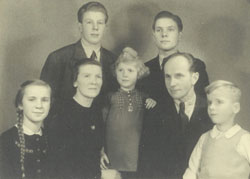
|
Healing Hug Home with links to my other websites
Webmaster's Bio
Healing Hug Guestbook
 Note: This article was originally published on Kelli Scheufler's "History of Peace Movements" topic at Suite101.com under the title "A Child's Home."
| War through the Eyes of a Childby Kelli Scheufler
 On February 5, 1945, Roosevelt, Stalin, and Churchill were in the thick of heated negotiations in Yalta, a city located on the shore of the Black Sea. Stalin insisted that this meeting take place on his territory. Roosevelt and Churchill obliged. These meetings were held in the sprawling, lavish Livadia Palace, the former summer residence of Czar Nicholas. World War II was nearing an end. These leaders, known as "The Big Three," and other heads of government had important decisions to make, determinations which would affect the fate of millions. How much reparations should be extracted from Germany without breaking their economy, making them a ward of the Allies? Would Russia declare war on Japan? What would become of Poland and Yugoslavia? They hammered out agreements, redrawing lines on the world map and deciding voting procedures for future meetings. On February 5, 1945, Roosevelt, Stalin, and Churchill were in the thick of heated negotiations in Yalta, a city located on the shore of the Black Sea. Stalin insisted that this meeting take place on his territory. Roosevelt and Churchill obliged. These meetings were held in the sprawling, lavish Livadia Palace, the former summer residence of Czar Nicholas. World War II was nearing an end. These leaders, known as "The Big Three," and other heads of government had important decisions to make, determinations which would affect the fate of millions. How much reparations should be extracted from Germany without breaking their economy, making them a ward of the Allies? Would Russia declare war on Japan? What would become of Poland and Yugoslavia? They hammered out agreements, redrawing lines on the world map and deciding voting procedures for future meetings.While The Big Three sat up in this palace on February 5, fighting the war on paper, Traute Wollenberg and her family were down on the ground, experiencing war firsthand. They were leaving her native city of Braunsberg, never to see it again. Braunsberg was normally covered in a layer of snow in February, but this year there was no snow. Incendiary bombs had been dropped on the city, some not igniting, and covering the cobblestones with yellow sulfur powder. The bombs which did ignite melted all the snow and eventually turned Braunsberg into flames. The Wollenberg's, along with everyone mobile, fled their burning city. Traute was nine years old in February of 1945, much like other girls her age. She did not think about the things going on around her, the significance of her birthplace or ethnic heritage. She lived in a child's world of wonder, full of dolls, insects, and songs. She would pick flowers by the side of the road, memorizing their shape, color, and texture so she could draw pictures of them at home. Traute learned to draw from her brother. She sat next to him, watching every move of his pencil until she could imitate his movements and make pictures of her own.
Traute's father, Willi, worked for the income tax department of the German government. Willi managed to avoid the war by making the most of a knee injury, always walking with a cane. This tactic worked for most of the war, but towards the end, he was drafted. The fate of army deserters was no secret. Willi did not want to leave his family fatherless. He had no choice but to join the ranks. He was not nimble enough to work on the front line, so he was assigned as a supervisor for a POW camp several hours away from home. He treated the prisoners at this camp with compassion. When he looked at them, he did not see ethnic or religious affiliation. He saw fathers, brothers, and sons. The army did not allow him any leave. He was separated from his wife and children for some time. He missed the gatherings of his family, the rituals which drew them together. One of these rituals was making music. Traute's father was a church organist, choir director, and band leader. He was a great entertainer and a popular choice for MC at wedding receptions. His passion for music flowed out to his family. Traute's mother taught the women at her church how to play guitar. She joined in with her stringed choir, enhancing the church services with their special music. The family gathered together every Sunday afternoon, forming their own family band. Traute's father pushed the pedals on the harmonium, an old-fashioned organ. Traute's siblings joined in with violins, cellos, and accordions. Traute's instrument of choice was her voice. She sang and sang, learning to sing before she could talk. The Wollenberg's had to leave their musical instruments behind on that day in February when fire consumed their city. Adina's will was not strong enough to fend off the invading Russians and she prepared her family to leave. She dressed them in several layers of their Sunday best and herded the little ones on a small handcart. She placed their Bible and family photographs with the small pile of belongings which she could fit on the cart. She did not expect her husband to join them from his job at the camp several hours away. All communications had been destroyed. Adina had no way of knowing that he was on his way. When he heard that the Russians were coming, he let the prisoners go free and deserted his post. He made it in time to join his family as they left their home. The Wollenberg's walked, day after day, eating food which other refugees were willing to share. Traute's store-bought shoes fell apart. The right sole became unglued and flapped with every step. Every mile took them farther away from their home. Burning cities illuminated the sky. The Wollenberg's hoped to make it to Danzig (now Gdansk), more than a hundred miles away. They had to cross on frozen water to get to the beach leading to this port city. During the night of their crossing, the ice broke under the weight of the wagons and horses. The adults carried the children to the beach, wading through waist deep water on top of the ice. They were lucky to make it alive to Danzig, where they lived in an abandoned apartment, one of the few not destroyed by bombs. Traute's father entertained his children by reading stories from their Bible, the same Bible which Traute's mother made sure accompanied them on their journey. Traute longed for adventure. She would venture out of the apartment, roaming around bomb shelters and gathering small pieces of shrapnel to add to a collection which she started. The Russians invaded Danzig on March 10, 1945. All the refugees were lined up against a fence, one group chosen to be shipped to slave labor concentration camps in Siberia, another herded into snow-covered fields. After presenting their legal German papers, the Wollenberg's were allowed to go to Berlin. They stayed with a family east of Berlin, in an uninsulated cottage which had icicles hanging from the ceiling. Traute's older brothers made it to Canada through the auspices of the North American Baptists. Within a year, one of her brothers raised enough money cutting trees in northern Manitoba to pay the fare for the rest of the family to join them in Canada. Traute still lives there today, but she will always remember her childhood home. The war destroyed her family's life in Braunsberg, leaving only memories of another time, another place. Traute cannot forget the horrors she witnessed, her family's journey, the pain in her feet as her shoes fell apart. To this day, she cannot stand by idly and witness the suffering of others. She has intervened on behalf of many in need, including a young refugee girl seeking asylum in Canada. And if you look in her closet, you will find only the most practical shoes, assuring that her feet are always comfortable. © Kelli Scheufler
|
The material on this site may be reproduced or republished only by special arrangement with the webmaster.
You are, however, welcome to pass on or link the URL.
 She was the fourth child born to German parents Willi and Adina Wollenberg. Her mother gave her first girl a special name, Traute, which means "the beloved girl who would be a trusted friend to her." Adina was a strong-willed, affectionate woman. When Hitler Youth leaders came to their house to pick up Traute's brothers, her mother summoned up that strong will, telling them off and refusing to let her sons go. Adina was used to speaking her mind. She grew up on a prosperous estate, one which her own mother spent most of her time managing. Adina had raised her younger siblings, and by the time her children came along, she had her own ideas on parenting. She did not like young men in uniforms coming around telling her that her boys had to attend the compulsory Hitler Youth meetings which would indoctrinate them with principles which she opposed. So she threw them out of her house.
She was the fourth child born to German parents Willi and Adina Wollenberg. Her mother gave her first girl a special name, Traute, which means "the beloved girl who would be a trusted friend to her." Adina was a strong-willed, affectionate woman. When Hitler Youth leaders came to their house to pick up Traute's brothers, her mother summoned up that strong will, telling them off and refusing to let her sons go. Adina was used to speaking her mind. She grew up on a prosperous estate, one which her own mother spent most of her time managing. Adina had raised her younger siblings, and by the time her children came along, she had her own ideas on parenting. She did not like young men in uniforms coming around telling her that her boys had to attend the compulsory Hitler Youth meetings which would indoctrinate them with principles which she opposed. So she threw them out of her house.